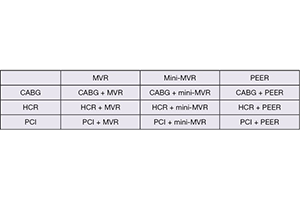A novel approach to ischemic mitral regurgitation (IMR)
Abstract
Ischemic mitral regurgitation (IMR) is a complicated medical condition with varying degrees of coronary artery disease and mitral regurgitation (MR). The traditional surgical treatment option for those with indications for intervention is coronary artery bypass grafting (CABG) plus or minus mitral valve repair or replacement (MVR). Percutaneous coronary intervention, hybrid coronary revascularization (HCR), and conventional CABG are three techniques available to address coronary artery disease (CAD). Percutaneous edge-to-edge repair, minimally invasive, and traditional sternotomy are accepted approaches for the treatment of MR. When taken in combination, there are nine methods available to revascularize the myocardium and restore competency to the mitral valve. While most of these treatment options have not been studied in detail, they may offer novel solutions to a widely variable and complex IMR patient population. Thus, a comparative analysis including an examination of potential benefits and risks will be helpful and potentially allow for more patient-specific treatment strategies.
Cover






